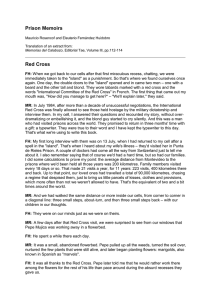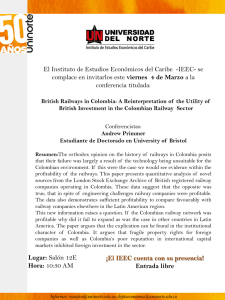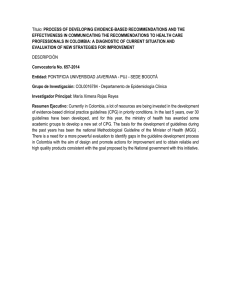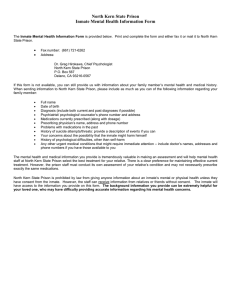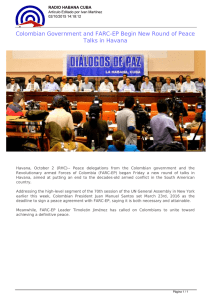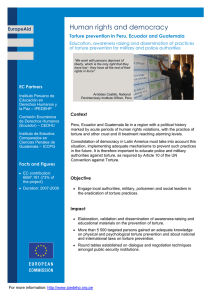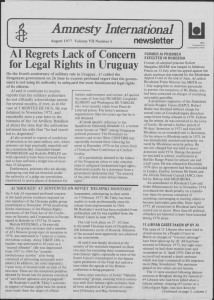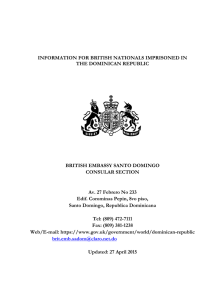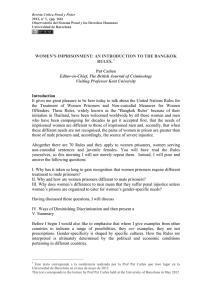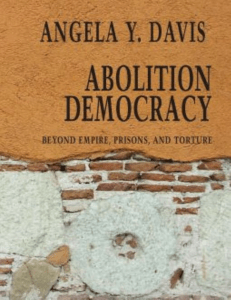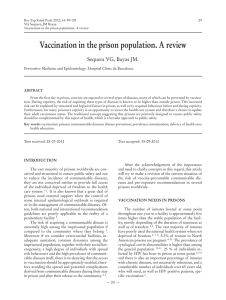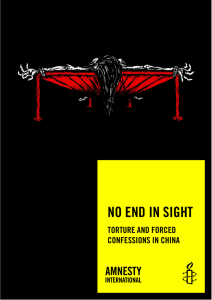Situation_detention_centers
Anuncio
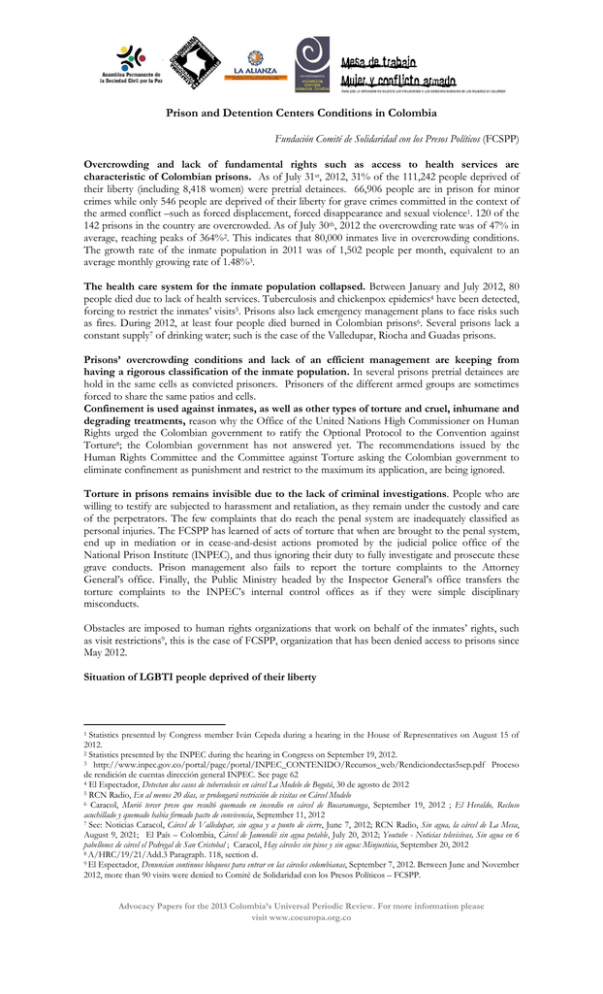
Prison and Detention Centers Conditions in Colombia Fundación Comité de Solidaridad con los Presos Políticos (FCSPP) Overcrowding and lack of fundamental rights such as access to health services are characteristic of Colombian prisons. As of July 31st, 2012, 31% of the 111,242 people deprived of their liberty (including 8,418 women) were pretrial detainees. 66,906 people are in prison for minor crimes while only 546 people are deprived of their liberty for grave crimes committed in the context of the armed conflict –such as forced displacement, forced disappearance and sexual violence1. 120 of the 142 prisons in the country are overcrowded. As of July 30th, 2012 the overcrowding rate was of 47% in average, reaching peaks of 364%2. This indicates that 80,000 inmates live in overcrowding conditions. The growth rate of the inmate population in 2011 was of 1,502 people per month, equivalent to an average monthly growing rate of 1.48%3. The health care system for the inmate population collapsed. Between January and July 2012, 80 people died due to lack of health services. Tuberculosis and chickenpox epidemics4 have been detected, forcing to restrict the inmates’ visits5. Prisons also lack emergency management plans to face risks such as fires. During 2012, at least four people died burned in Colombian prisons6. Several prisons lack a constant supply7 of drinking water; such is the case of the Valledupar, Riocha and Guadas prisons. Prisons’ overcrowding conditions and lack of an efficient management are keeping from having a rigorous classification of the inmate population. In several prisons pretrial detainees are hold in the same cells as convicted prisoners. Prisoners of the different armed groups are sometimes forced to share the same patios and cells. Confinement is used against inmates, as well as other types of torture and cruel, inhumane and degrading treatments, reason why the Office of the United Nations High Commissioner on Human Rights urged the Colombian government to ratify the Optional Protocol to the Convention against Torture8; the Colombian government has not answered yet. The recommendations issued by the Human Rights Committee and the Committee against Torture asking the Colombian government to eliminate confinement as punishment and restrict to the maximum its application, are being ignored. Torture in prisons remains invisible due to the lack of criminal investigations. People who are willing to testify are subjected to harassment and retaliation, as they remain under the custody and care of the perpetrators. The few complaints that do reach the penal system are inadequately classified as personal injuries. The FCSPP has learned of acts of torture that when are brought to the penal system, end up in mediation or in cease-and-desist actions promoted by the judicial police office of the National Prison Institute (INPEC), and thus ignoring their duty to fully investigate and prosecute these grave conducts. Prison management also fails to report the torture complaints to the Attorney General’s office. Finally, the Public Ministry headed by the Inspector General’s office transfers the torture complaints to the INPEC’s internal control offices as if they were simple disciplinary misconducts. Obstacles are imposed to human rights organizations that work on behalf of the inmates’ rights, such as visit restrictions9, this is the case of FCSPP, organization that has been denied access to prisons since May 2012. Situation of LGBTI people deprived of their liberty Statistics presented by Congress member Iván Cepeda during a hearing in the House of Representatives on August 15 of 2012. 2 Statistics presented by the INPEC during the hearing in Congress on September 19, 2012. 3 http://www.inpec.gov.co/portal/page/portal/INPEC_CONTENIDO/Recursos_web/Rendiciondectas5sep.pdf Proceso de rendición de cuentas dirección general INPEC. See page 62 4 El Espectador, Detectan dos casos de tuberculosis en cárcel La Modelo de Bogotá, 30 de agosto de 2012 5 RCN Radio, En al menos 20 días, se prolongará restricción de visitas en Cárcel Modelo 6 Caracol, Murió tercer preso que resultó quemado en incendio en cárcel de Bucaramanga, September 19, 2012 ; El Heraldo, Recluso acuchillado y quemado había firmado pacto de convivencia, September 11, 2012 7 See: Noticias Caracol, Cárcel de Valledupar, sin agua y a punto de cierre, June 7, 2012; RCN Radio, Sin agua, la cárcel de La Mesa, August 9, 2021; El País – Colombia, Cárcel de Jamundiì sin agua potable, July 20, 2012; Youtube - Noticias televisivas, Sin agua en 6 pabellones de cárcel el Pedregal de San Cristobal ; Caracol, Hay cárceles sin pisos y sin agua: Minjusticia, September 20, 2012 8 A/HRC/19/21/Add.3 Paragraph. 118, section d. 9 El Espectador, Denuncian continuos bloqueos para entrar en las cárceles colombianas, September 7, 2012. Between June and November 2012, more than 90 visits were denied to Comité de Solidaridad con los Presos Políticos – FCSPP. 1 Advocacy Papers for the 2013 Colombia’s Universal Periodic Review. For more information please visit www.coeuropa.org.co Colombia Diversa continues to document complaints from LGBTI inmates regarding: 1) prohibitions and obstacles to the enjoyment of the right to conjugal visits for same sex couples, 2) punishments for public displays of affection between same sex couples within the prison system, specially between lesbians, and 3) illegal limitations to the right to express their gender identity, especially against transgender persons10. Prison authorities make a wrongful interpretation of the Constitutional Court Sentence T-622 of 2010. It is believed that the sentence allows for disciplinary sanctions against lesbian couples for public displays of affection in prisons (without having incurred in obscene acts). Disciplinary sanctions were observed by public ministry official in El Pedregal prison in Medellin. The Constitutional Court in Sentence T-062 of 2011 ordered the INPEC’s Director to “reform the prison and jail system regulating norms to make them compatible with the protection of the constitutional rights of the inmates with a diverse identity or different sexual preference”. To date the INPEC has not comply with what was ordered in the Sentence and complaints about abuse against LGBTI population are still being documented. The Colombian State should: 1. Comply with the recommendations from international organizations; accept the ability of the Committee against Torture to know about individual complaints; and to ratify and implement the Optional Protocol to the Convention against Torture. 2. Colombia should eliminate confinement as a disciplinary punishment; guarantee the right to health and access to drinking water on a permanent basis; investigate in a prompt and independent manner all torture complaints as well as other cruel, inhumane and degrading treatments in prisons and temporary detention centers. 3. Implement a criminal and prison policy in agreement with international human rights law, with differential approach for LGBTI people, women, handicapped, indigenous, Afro-Colombians and other vulnerable population deprived of their liberty. 4. Design a comprehensive health care and metal care system that would guarantee quality, universality and continuity for health services; and implement programs in health care prevention and protection for all the inmate population. 5. Through a public policy that limits the indiscriminate use of deprivation of liberty as punishment, adopt effective measures to improve the prisons conditions, reduce overcrowding and effectively respond to all of the fundamental needs of the inmate population. 10 Even though there are several Directives issued by the National Prison Institute (INPEC) that orders prison officials to respect the rights of LGBTI people (especially Directive 011 of February 18, 2003 and the Permanent Directive 0010 of July 5, 2011), reports of abuse still persist, evidencing the lack of compliance. Advocacy Papers for the 2013 Colombia’s Universal Periodic Review. For more information please visit www.coeuropa.org.co
